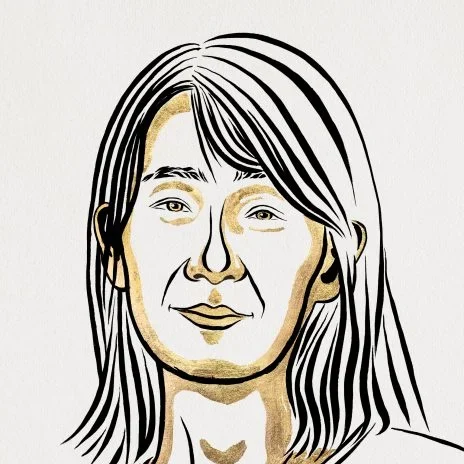
Nobel Prize in Literature – commentary by dr Hae Sung Lee from the UWr Faculty of Modern Languages, Literatures and Cultures
The 2024 Nobel Prize in Literature was awarded to a South Korean writer, Han Kang. Dr Hae Sung Lee from the Korean team at the Institute of Classical, Mediterranean and Oriental Studies believes this is a sign that Korea is transforming from a cultural power into a truly culturally rich nation. Here is the full commentary from the university’s Korean Studies scholar:
The Swedish Academy announced that Han Kang has been awarded the 2024 Nobel Prize in Literature for her “intense poetic prose that confronts historical traumas and exposes the fragility of human life.” Ironically, I became acquainted with Han Kang’s work through a Polish student. In the academic year 2019/2020, Aleksandra Wolna, then a Korean Studies student, wrote her bachelor’s thesis titled “Analiza przedstawienia przemocy państwowej podczas powstania w Gwangju w 1980 roku w wybranych utworach literatury pięknej” under my supervision. In her thesis, after reading Human Acts (소년이 온다) by Han Kang, Aleksandra came to a conclusion that “the author refers to national identity, and the context of a specific nation and its history is clearly visible.” In other words, she noted that this novel, by portraying the brutality of military actions and the suffering of civilians during the Gwangju Uprising, contributes to shaping empathy and a sense of solidarity with the victims. Inspired by her analysis, I decided to read the book. It was a moment of reflection on the universal values that we sometimes forget.
Four years later, in the academic year 2023/2024, Aleksandra Wolna reminded me of Han Kang once again. While writing her master’s thesis in Polish Studies at the University of Wrocław titled “Analiza zjawiska buntu przeciw porządkowi społecznemu w literaturze koreańskiej,” she “commanded me” (requested a review) to read The Vegetarian. Thanks to her, I noticed in this novel not only the widespread state violence in Korea’s turbulent history – colonial period, division and war, military dictatorship, and the struggle for democracy – but also another form of deeply rooted violence in Korean society, characterized by patriarchy and sometimes even misogyny. Although I am a sociologist, I usually avoid feminist topics. This is because Korean feminists, unlike their European counterparts, often display misandrist tendencies (some extreme feminists engaged in politics seem to pursue an “anti-male” ideology rather than a “pro-female” one). Therefore, I am more drawn to femaleism, which goes beyond the confines of feminism. However, Han Kang’s “The Vegetarian” presents women’s identity in a different light. It shows that a woman experiencing frustration and limitations is trapped in the stereotype of “being a woman.” Yet, a novel depicting frustration doesn’t always have to frustrate the reader. Korean society is constantly changing, and I hope that “The Vegetarian” will become a catalyst for positive transformations.
The writer Han Kang was placed on a blacklist of the cultural and artistic sectors under the government of former President Park Geun-hye and faced negative consequences as a result. Individuals with a healthy sense of citizenship were deemed anti-national and disobedient by “conservative” forces steeped in authoritarian thinking. Those in the Korean political scene who call themselves “conservatives” are not true conservatives. They are anti-democratic reactionaries. The “right” is neither true right nor nationalist; they are anti-national sympathizers of Japan. The so-called “pragmatists” are not genuine pragmatists; they are opportunists who only care about their own interests. Unfortunately, this is still the case.
K-Pop, K-movie, K-beauty, K-food… Today, Korean culture makes its presence felt worldwide. Kim Gu, an independence activist, wrote in his autobiography Baekbeomilji, published in 1947:
I wish for our country to become the most beautiful country in the world. I do not want it to be the richest. I have suffered from the invasions of others, so I do not want my country to attack others. Our economic strength should be sufficient to ensure a prosperous life for us, and our military strength should be enough to repel invasions. What I desire is the power of culture. This is what brings us happiness and allows us to bring happiness to others. Humanity currently lacks neither military nor economic strength. While there is never enough power in the natural sciences, looking at humanity as a whole, the current level is sufficient for living in prosperity. The main reason for the current misery of humanity is the lack of kindness, justice, compassion, and love. If these values were to develop, the existing material resources would be sufficient for two billion people to live in prosperity. It is culture that shapes these values in people. I desire for our country not to imitate others, but to become a source, a goal, and a model of a new, noble culture. I wish for true peace in the world to be established through our country and our actions.
Poland, with five Nobel laureates in literature, is one of the leading literary countries in the world. South Korea has just welcomed its first Nobel Prize winner. The awarding of the Nobel Prize to Han Kang fills me with deep hope that it will serve as an impulse to transform South Korea from a cultural power known for K-Pop, K-movies, K-food, K-beauty, etc., into a truly cultural nation. I believe this success will help South Korea overcome the obstacles on its path to becoming a cultural country, and that the so-called “conservatives,” “right-wing,” and “pragmatists” will disappear like snow under the sun.
Translated by Julia Kołakowska (student of English Studies at the University of Wrocław) as part of the translation practice.
Read the interview with the author of the commentary:



